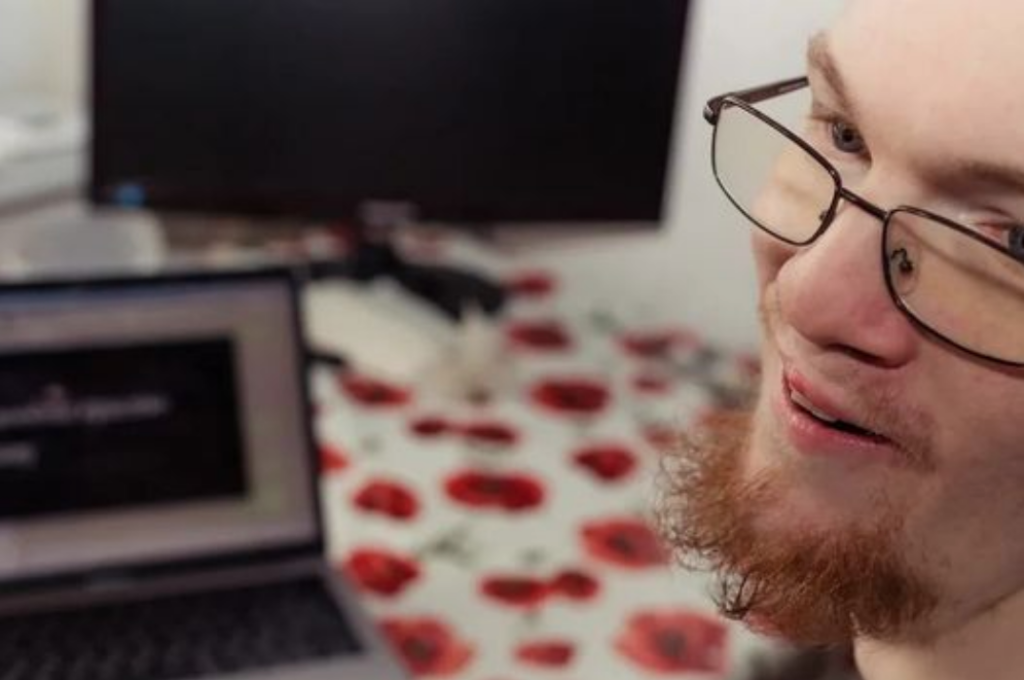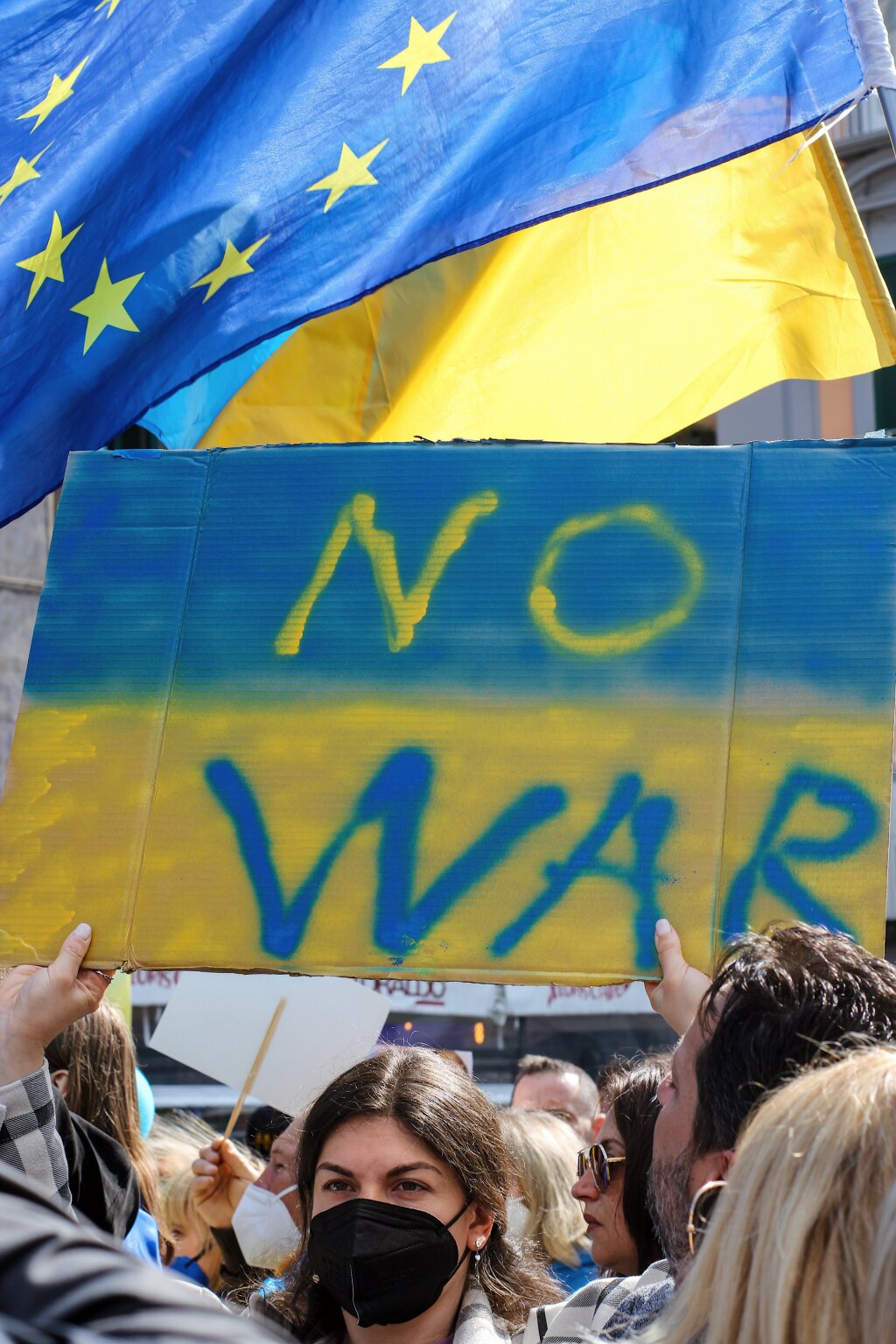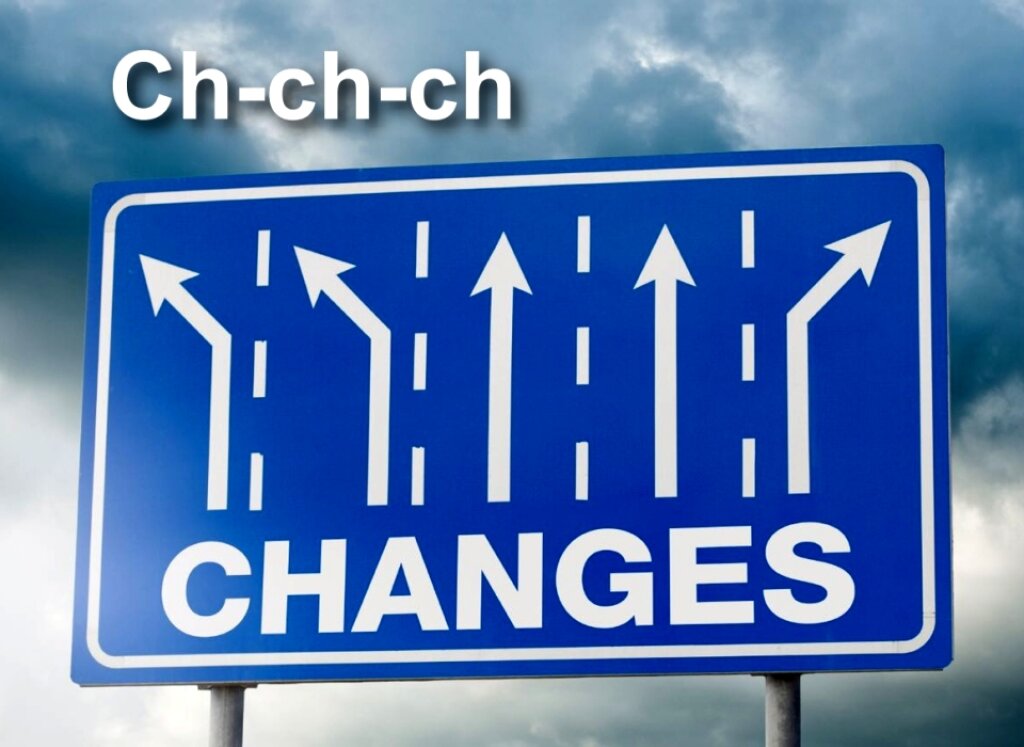The Jordan Center stands with all the people of Ukraine, Russia, and the rest of the world who oppose the Russian invasion of Ukraine. See our statement here.
This post draws from the article “But We Are Always at Home’: Disability and Collective Identity Construction on Runet,” which originally appeared in Studies in Russian, Eurasian and Central European New Media.
Philippa Mullins, Ph.D., is an Assistant Professor at American University of Armenia, where she teaches in the MA Program in Human Rights and Social Justice.
Above: A photo of Ivan Bakaidov drawn from the Facebook post that launched the #ButWeAreAlwaysAtHome social media campaign. Bakaidov’s face is shown close-up and semi-profile. He is looking across the camera and with an expression as though speaking. Behind him, an open laptop and a computer monitor are set on a table with a poppy-patterned tablecloth.
An online campaign against exclusion
Ivan Bakaidov describes himself as a "web activist with cerebral palsy." In March 2020, as Covid-19 lockdown measures were announced in his hometown of Saint Petersburg, Bakaidov launched the hashtag campaign #ButWeAreAlwaysAtHome (#AMyVsegdaDoma) on Facebook, VKontakte, and Instagram.
Lockdowns perhaps feel a long time ago now—for some of us. And that is the point made by the #ButWeAreAlwaysAtHome campaign: for some, lockdowns have already become a phenomenon of the past. However, for many disabled people in Russia, being at home is a permanent reality that extends far beyond any pandemic.
Among other things, disability is the lived experience of social inequality. The material environment in Russia is often inhospitable or inaccessible for disabled people. Getting out of one’s home—say, an apartment building without an elevator—can be difficult. Moreover, within the material public sphere, accounts of stigmatization and harassment are common.
Part of lived social inequality for disabled people in Russia is the constructed and imposed discomfort, or even impossibility, of going out. For many, this situation results in spending much time at home. The hashtag points squarely at this difference: while you might be at home right now, we are always at home.
The campaign sought to harness the discrepancy between the experiences of disabled and non-disabled people and its sudden equalization, however brief and partial. Now, everyone was at home. Could this generate solidarity with disabled people? Could this drive change? An affirmative answer was the hopeful premise behind Bakaidov’s campaign.
Bakaidov’s claims
In the post launching the hashtag, Bakaidov reflected on how routine "a state of 'quarantine'" is for him. He observes that, "basically, the world can [now] experience the conditions" lived by disabled people. Finally, non-disabled people might understand the situation of disabled people, and respond by working for a more accessible world.
In Bakaidov’s initial text, redistributive calls to shift how our social world is organized (he would like more food delivery services and free online cinemas) co-existed with claims of recognition. Bakaidov asked for disabled people to share "stories about life within four walls" and "lifehacks" developed through "isolation." He thus suggested that the conditions of disability become those of creativity and mastery. Bakaidov advocated sharing this hard-won expertise with non-disabled people, who might now also find it "useful."
I identify these as recognition claims because they reposition disabled people—so often stigmatized—as holders of valuable knowledge and creativity that resists exclusion. They situate disabled people as peers from whom currently non-disabled people might learn.
Together, the redistribution and recognition claims frame an injustice. Disabled people have equal moral worth. Despite this fact, they experience unequal treatment—isolated at home and finding it difficult to access many things which currently non-disabled people may take for granted.
The elicitation is thus an individual’s statement which both names and speaks from the position of a wronged collective "we" (#ButWeAreAlwaysAtHome). Next, others’ posts would step into and renegotiate this elicitation.
Building a collective "we"
The hashtag was immediately picked up by media outlets, NGOs, and individuals. Bakaidov’s initial post garnered hundreds of comments and reposts across Facebook, VKontakte, and Instagram. It generated posts using the hashtag—mainly by people identifying themselves as disabled or as family members (largely mothers) of disabled people.
As people told and retold stories under the hashtag, they joined in constructing the collective "we" proposed by Bakaidov—a "we" defined by its experiences, as well as by the contrast with those of others who may be now, but are not always, at home.
In fact, while Bakaidov had proposed some extension of a collective experience to include non-disabled people, this commonality was often rejected. Indeed, the gulf between the lot of the hashtag’s collective "we" and that of others was a source of grievance. In many of the social media posts tagged with the hashtag, lifehacks receded, to be replaced by expressions of fury and frustration.
Guiding these expressions, Bakaidov’s term "permanent quarantine" appears particularly resonant: "Quarantine is our normal life!!!", "Most of the time we’re in isolation, we’ve been in #quarantine for 12 years...", "We really have been living in forced 'quarantine' almost since being born." People posting under the hashtag strongly distinguished their permanent quarantine from that briefly experienced by others under Covid-19 alone.
The frame of "permanent quarantine" Bakaidov’s post offered generated a community of recognition. Disabled people and their family members built collectivity through their retelling of constructed exclusion. In doing so, they used online connectivity to transform experiences of isolation into a source of community—and to claim justice.
Through stories of how their "permanent quarantine" is created, disabled people and their family members drew attention to the constructed nature of their social isolation. Failure to clear streets in the autumn and winter; various forms of built inaccessibility; stigmatization through pointing and staring by strangers; patronizing attitudes; and the assumptions of inability were just some of the obstacles commenters cited as rendering the material public sphere inaccessible to them, particularly as equals to non-disabled people.
These comments framed the claim for justice: no one wants to be forced into permanent isolation, and isolation is made necessary only by the exclusionary construction of society. This state of affairs, therefore, something that might be challenged and changed.
Solidarity and change?
This claim for justice brings us back to the hashtag’s hopeful starting point: could the conditions of Covid-19 be leveraged to create change? Could they build solidarity between disabled and non-disabled people? Or, as one mother of a disabled child wrote, would a temporary quarantine make other people "shudder for a minute, [but] not on our account"? For this woman, Covid-19 was unlikely to broaden the contours of the collective "we" who might fight for access. Rather, she wrote, "they" will forget "us" and "we – we’ll just stay locked up in our world."
Rather than broadening solidarity to go beyond disabled people and their family members, the hashtag appeared primarily to be used to build solidarity among them. Moreover, the outcome of claims for justice remains—perhaps frustratingly—beyond what I can determine in this blogpost. Measured against a desire for concrete policy outcomes, perhaps the hashtag was insignificant. No groundswell of support or policy change can be traced to #ButWeAreAlwaysAtHome. More broadly, we see both the harshly disproportionate impact of Covid-19 on disabled people and examples of backsliding on access measures enacted under Covid-19.
Still, the hashtag offered another opportunity to tell a story, build recognition, and claim justice. In wanting to see an immediate outcome in policy or legislative terms, we neglect the cumulative importance of building community, telling new stories, and imagining new horizons of possibility. Such shifts may lay the groundwork for future policy change. More immediately, the hashtag’s value was seen in the community’s response to it: "My son only has the internet. Fourth floor, no lift. Mainly at home. You’ve thought of an excellent idea!!!"
Beyond the hashtag
The hashtag and the posts it inspired guide us toward some perennial questions. Beyond asking what change the hashtag has caused, we might ourselves participate in change by acting on these questions.
First: what are the dangers of the home and being unable to leave it? Disability activists and NGOs in Russia and beyond have campaigned against large-scale institutions and the abuses that occur within their walls. They have drawn attention to violence within the home, including that committed by the person receiving allowance as the registered "caregiver" for the disabled person. As Russia continues to attack Ukraine, disabled people have struggled to access necessary support and to evacuate. Within Russia, disabled people have experienced disruption of medical supplies and increasing costs—even as they are less likely to be able to join the latest waves of Russian emigration.
Second: what is the condition, and what are the limits, of our solidarity? Who participates in our "we"? The hashtag suggests a duty to look toward, learn from, and act on accounts of exclusion. It pushes us to examine where we draw the boundaries of our empathy and action. It asks us to consider how we are defined by who participates and how, as well as by who does not. In 2016, Judith Butler noted that "every public square is defined in part by the population that could not possibly arrive there." So too is our "we."



